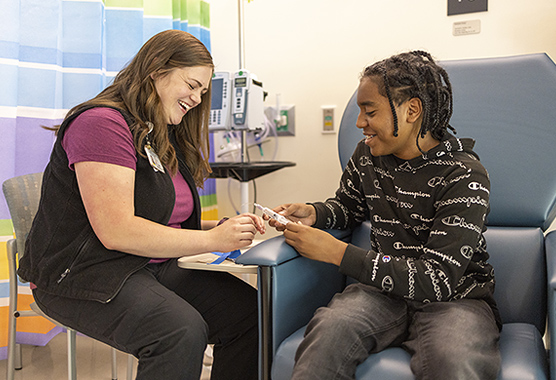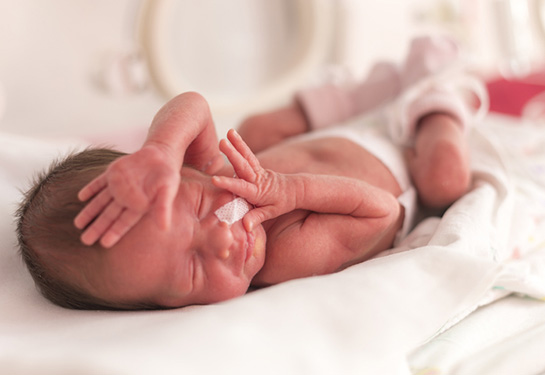Pediatric Cancer
We offer the latest therapies for children and opportunities to take part in clinical trials. Our compassionate staff and child life specialists support every aspect of your family and child’s well-being.
Medically reviewed by Anjali Pawar, M.D. on Nov. 28, 2023.

Support for Your Child’s Cancer Journey
At UC Davis Health Comprehensive Cancer Center, we offer the only program in the region for managing the long-term effects of cancer treatment in children. Our long-term effects specialists will continue to support your child in the years after treatment.
Types of Pediatric Cancers
Pediatric cancers, also called childhood cancers, are cancers that occur in children and teenagers. The most common childhood cancers are:
- Bone cancers
- Brain and spinal cord tumors
- Leukemias
- Lymphomas
- Solid tumors
Survival rates depend on the type of cancer. Children who survive cancer face higher risks of getting cancer again and other health problems.
Symptoms of Cancer in Children
It can be hard to recognize cancer symptoms in children. Sometimes symptoms don’t look like a sign of something serious.
Common Symptoms
Childhood cancer symptoms may include:
- Bruising easily
- Changes in the eyes or vision that happen suddenly
- Fatigue or weakness
- Frequent fevers or infections
- Nausea or vomiting that don’t go away
- Swelling, lumps or masses that you can see or feel
- Unexplained weight loss
Emergency Symptoms
Childhood cancer symptoms that require medical treatment right away include:
- Sudden vision loss
- Severe headaches
- Severe change in muscle strength or how a child walks
- Shortness of breath
- Inability to lay flat in bed
Causes of Cancer in Children
With many childhood cancers, the cause is unknown. However, in rare cases, there are some inherited or familial conditions that can predispose a child to cancer.
Genetic Mutations
Childhood cancers are caused by genetic mutations. These gene changes can cause growth of abnormal cells that become cancerous. Children with Down syndrome have a higher risk of certain cancers, such as leukemia.
Inherited Conditions
Certain rare genetic conditions may cause cancer in children. Examples include Beckwith-Wiedemann syndrome, Fanconi anemia, Gorlin’s syndrome, Li-Fraumeni syndrome, neurofibromatosis and von Hippel-Lindau syndrome.
Risk Factors for Childhood Cancer
Chemical Exposure
Exposure to some chemicals, such as pesticides, solvents in cleaners or air pollutants, may increase risk.
Immunosuppressant Drugs
These medications make it harder for your child’s immune system to destroy cancer cells on their own.
Radiation Exposure
Radiation may increase the risk of childhood leukemia and other cancers by causing mutations in cells.
Diagnosing Pediatric Cancers
We offer state-of-the-art techniques and equipment for cancer diagnosis. Diagnosis for suspected childhood cancer often starts with blood tests. A blood test may be the only test needed to diagnose leukemia and lymphoma.
Other cancers usually require additional tests. These may include:
- Ultrasound: This scan uses sound waves to create an image that shows the location of tumors.
- CT scan: The scan provides a detailed picture for visual detection of tumors.
- MRI: The scan gives an image of your child’s internal organs and body structures.
- PET scan: This type of imaging helps identify abnormal cells in the body that may be cancerous.
- MIBG scan: A scan that uses nuclear imaging to help assess neuroendocrine tumors.
- Biopsy: A surgical oncologist removes a small tissue sample to examine it for cancer cells.
- Lumbar puncture: A specialist uses a needle to remove a sample of spinal fluid and then analyzes it for cancer cells.
Pediatric Cancer Treatments at UC Davis Health
At the UC Davis Comprehensive Cancer Center’s pediatric oncology program, a team of specialists work together to provide the most advanced care for your child. We also offer support services for parents and siblings.
If your child needs an extended hospital stay, UC Davis Children’s Hospital is among the top children’s hospitals in the nation.
Treatment depends on the type of cancer your child has, how advanced it is and which areas of the body it affects. Pediatric cancer treatment may include one or more therapies.
Chemotherapy
“Chemo” involves using drugs that stop cancer cell growth. We provide intravenous (IV) chemotherapy treatments in a relaxed, friendly area.
Immunotherapy
This treatment uses drugs that boost your child’s immune system to help it destroy cancer cells.
Radiation Therapy
This treatment is often used with chemotherapy, immunotherapy or surgery. It uses powerful radiation to destroy cancer cells to stop tumor growth. We offer the most precise, state-of-the-art radiation techniques available.
Stem Cell Transplant
This treatment is sometimes called a bone marrow transplant. It uses your child’s own stem cells or a donor’s stem cells to make other types of healthy cells. This improves recovery following other treatments. We’re a designated National Marrow Donor Program Transplant Center, which gives us access to over 22 million registered stem cell donors.
Surgery
For this treatment, a surgical oncologist removes tumors and sometimes nearby tissue. We offer highly specialized procedures for removing tumors in any area of your child’s body.
Preventing Childhood Cancers
Many of the causes of childhood cancers are genetic and thus not preventable. If your child has any risk factors, it’s important to keep up with scheduled physician visits and ask about cancer screening. With proper family history, they may be detected early but they are not preventable.
Who does it affect?
300KChildren worldwide are diagnosed with cancer each year
Leukemia makes up
28%Of childhood cancers
Sources: American Childhood Cancer Organization: U.S. Childhood Cancer Statistics
American Cancer Society: Types of Cancers that Develop in Children
Request an Appointment
As Sacramento's No. 1 hospital, you'll benefit from unique advantages in primary care and specialty care. This includes prevention, diagnosis and treatment options from experts in 150 specialties.
Referring Physicians
To refer a patient, submit an electronic referral form or call.
800-4-UCDAVIS
Patients
Call to make an appointment.
Consumer Resource Center
800-2-UCDAVIS

Ranked among the nation’s best hospitals
A U.S. News & World Report best hospital in cardiology, heart & vascular surgery, diabetes & endocrinology, ENT, geriatrics, neurology & neurosurgery, and pulmonology & lung surgery.

Ranked among the nation’s best children’s hospitals
U.S. News & World Report ranked UC Davis Children’s Hospital among the best in pediatric nephrology, orthopedics*, and pulmonology & lung surgery. (*Together with Shriners Children’s Northern California)

Ranked Sacramento’s #1 hospital
Ranked Sacramento’s #1 hospital by U.S. News, and high-performing in aortic valve surgery, back surgery (spinal fusion), COPD, colon cancer surgery, diabetes, gynecological cancer surgery, heart arrhythmia, heart failure, kidney failure, leukemia, lymphoma & myeloma, lung cancer surgery, pacemaker implantation, pneumonia, prostate cancer surgery, stroke, TAVR, cancer, orthopedics, gastroenterology & GI surgery, and urology.

The nation’s highest nursing honor
UC Davis Medical Center has received Magnet® recognition, the nation’s highest honor for nursing excellence.

World-class cancer care
One of ~59 U.S. cancer centers designated “comprehensive” by the National Cancer Institute.

A leader in health care equality
For the 13th consecutive year, UC Davis Medical Center has been recognized as an LGBTQ+ Healthcare Equality Leader by the educational arm of America’s largest civil rights organization.

